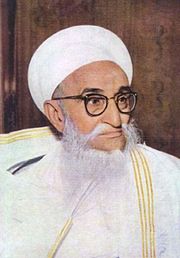Syedna Taher Saifuddin | |
|---|---|
طَاهر سيف الدِّين | |
 | |
| Da'i al-Mutlaq | |
| In office 1915–1965 | |
| Preceded by | Abdullah Badruddin |
| Succeeded by | Mohammed Burhanuddin |
| Title |
|
| Personal | |
| Born | Taher 4 August 1888 |
| Died | 12 November 1965 (aged 77) |
| Resting place | Raudat Tahera, Mumbai |
| Religion | Islam (Shia Islam) |
| Home town | Mumbai |
| Spouse | Husaina |
| Parents |
|
| Citizenship | Indian |
| Sect | Isma'ili Dawoodi Bohra |
| Jurisprudence | |
| Style | His Holiness |
| Chancellor, Aligarh Muslim University | |
| In office 1953–1965 | |
| Preceded by | Raza Ali Khan |
| Succeeded by | Hafiz Saeed Ahmad Khan |
Taher Saifuddin (4 August 1888[a] – 12 November 1965[4]), also known as Tahir Sayf al-Din,[5] was the 51st and longest serving Da'i al-Mutlaq of the Dawoodi Bohras.[6] Saifuddin adapted the modernisation in Western and European ideas, and established its benefits for the Bohras, whilst still steeped in the traditions and the culture of the community's Fatimid heritage.[1][4][7] Saifuddin laid substantial groundwork in terms of philanthropy, education, entrepreneurship, social outreach, political outreach, and community upliftment[7] upon which his successors, Mohammed Burhanuddin and Mufaddal Saifuddin, continued to build,[8] resulting in an unprecedented era of prosperity among the Dawoodi Bohras.[9][10]
- ^ a b Cite error: The named reference
dmolwas invoked but never defined (see the help page). - ^ Cite error: The named reference
timesdirwas invoked but never defined (see the help page). - ^ Cite error: The named reference
dobconwas invoked but never defined (see the help page). - ^ a b Cite error: The named reference
farhistwas invoked but never defined (see the help page). - ^ Cite error: The named reference
encwas invoked but never defined (see the help page). - ^ Mohiyuddin, Hozefa (1995). Tufatuh ale Akhbaare Hudat. Al Jamea tus Saifiyah Publication. p. 109.
- ^ a b Cite error: The named reference
docthewas invoked but never defined (see the help page). - ^ Bubere, Abdul Sami (10 November 2019). "Meeting with the Three Syednas". Mumbai: The Free Press Journal. Archived from the original on 10 November 2019.
- ^ Patel, Aakar (25 January 2014). "A Leader for Every Generation". livemint.com. Archived from the original on 29 January 2014.
- ^ Ingber, Hanna (24 April 2011). "How Bohra Muslims set themselves apart". pri.org. Archived from the original on 24 June 2019.
Cite error: There are <ref group=lower-alpha> tags or {{efn}} templates on this page, but the references will not show without a {{reflist|group=lower-alpha}} template or {{notelist}} template (see the help page).
